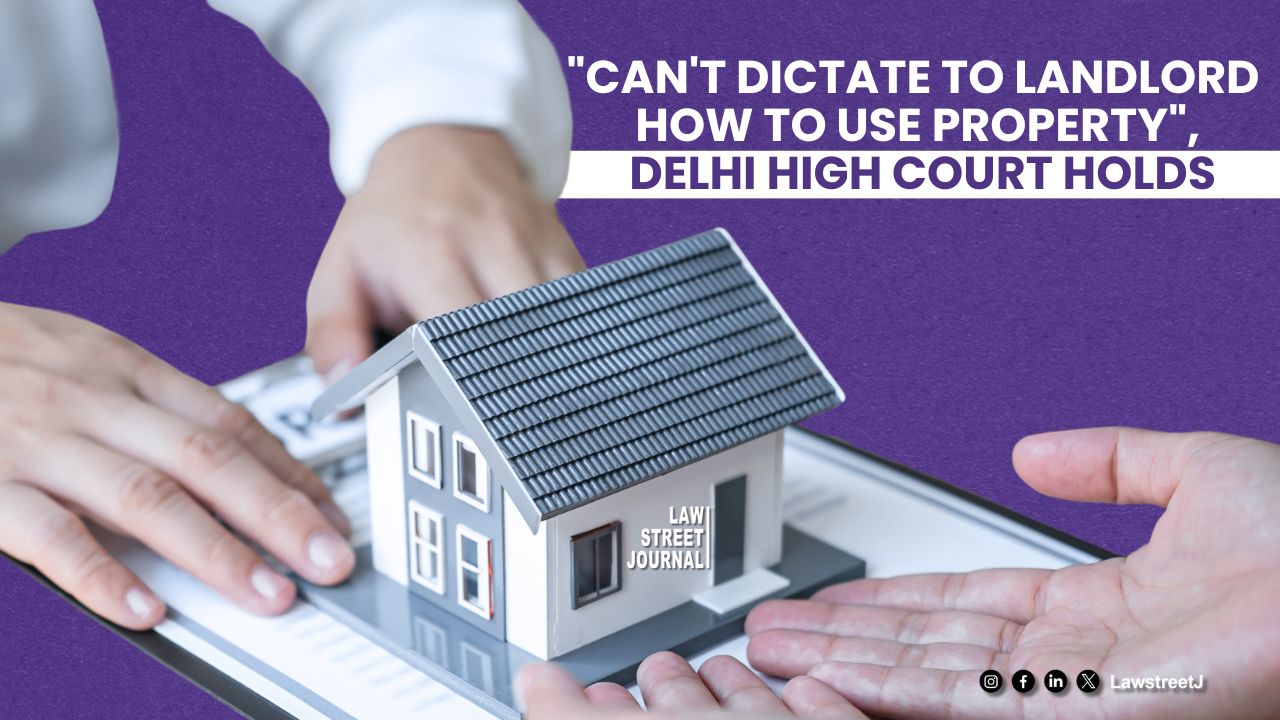NEW DELHI: Ordering in favour of a landlord who sought the eviction of tenants from his rented property for his son who wanted to run a 5-star restaurant on it, the Delhi High Court has held, it is trite law that tenant cannot dictate to landlords as to how the property has to be utilized.
The bench of Justice Jasmeet Singh was hearing a revision petition preferred by the tenants against an eviction order.
The order of eviction was passed with respect to shop municipal no. 1635, Shyama Prasad Mukherjee Marg, Delhi-110006 admeasuring 217 sq. ft. (tenanted premises), against the tenant.
Dismissing the revision petition the Court held that, The desire of the landlords of running a restaurant cannot be faulted with as they are the best judge of their requirement.
The basic facts of the case are that a son and father were the joint owners of the tenanted premises. At the time of purchase the tenants were already occupying the property and started paying the rent to the father and son.
Subsequently, the son who went to study MBA in an Australian university returned after the completion of his course and sought to open a 5-star restaurant for which he filed sought eviction of various tenanted premises, including the present disputed one.
While he received the vacant and peaceful possession of 9 out of 13 tenanted properties, he was still fighting in courts for the possession of the others, including the present property.
Landlords arguments
They filed an eviction petition against their tenant under Section 14(1)(e) of the Delhi Rent Control Act, 1958 (DRC Act) for recovery of the tenanted premises which was let out for non-residential purpose at the monthly rent of merely Rs. 120.80 per month excluding electricity charges.
They based their argument on bona fide requirement of the tenanted premises.
They argued that the father was already running a hotel business to which they sought to add a plush restaurant to expand their business. They added that there were no other hotels in the area with such restaurants and the restaurant would give them an edge over their competitors. They submitted that they had already prepared a project report for the same.
Thus, they claimed to require 5000 sq ft to open the said restaurant, and supplemented their argument stating that although the son had sufficient experience and knowledge with his education from Australia, the tenanted premises on the ground floor was a hindrance to fructifying their plans.
They also argued that as no triable issue was raised in the revision petition by the tenant and they needed the property for bona fide commercial use therefore, they were entitled to relief as claimed under Section 14(1)(e) of the DRC Act.
Tenants arguments
The tenant argued that the landlords had neither disclosed the proper area under their possession nor disclosed the proper area possessed by other 14 tenants.
They said that the son did not have sufficient knowledge or experience to run the restaurant and claimed that the eviction petition was nothing but an afterthought as the rent in the area had astronomically risen.
They stated that the eviction petition was merely due to the intention of the landlords to seek a higher rent from the tenant or to sell the tenanted premises at a premium.
They also argued that as the son was fully employed and earning heavy profit from the existing hotel business, therefore, the tenanted premises is not required.
Courts order and reasoning
Ruling in favour of the landlords, the Court said that Landlords cannot be deprived of the beneficial enjoyment of their property. Further, the Court is not to sit in the arm chair of the landlords to dictate as to how the property should be utilized. It is the sole discretion of the landlords to get all the tenanted premises vacated and use as per their need.
At the outset the Court said that as per laid down law, the High Court is obliged to test the order of the Rent Controller on the touchstone of whether it is according to law only and that the jurisdiction of this court is very restrictive and can only be exercised sparingly.
The Court reasoned that as per Section 14(1)(e) of the DRC Act, only the following ingredients are required to be satisfied by the landlords:-
a. Relationship of landlord and tenant.
b. The landlord required the premises bona fidely for his needs/or for his family members.
c. Landlord must not have an alternate, suitable accommodation.
Finding the first ingredient to have been held to be satisfied, the Court considered the fact that the landlords had presented a prepared project report, not leased out or and also not disposed of the other tenanted premises which they had acquired peaceful possession of.
It rejected the tenants contention that the landlords son is required to show prior experience in the business he intends to start.
It upheld, basis prior judgments that, landlords are not required to possess or to show any prior experience to start a new business and additionally they are also not bound to start the same business.
It thus arrived at the conclusion that there is no material on record which shows that the need of the landlords is either malafide or fanciful.
On the third issue of alternate suitable accommodation, the Delhi High Court noted that while the tenant had argued that the landlords have already received the possession of 4813 sq. ft. of the area from other tenants which can be utilized for their bonafide requirement, the landlords had categorically stated that they need about 5000 sq. ft. of area on the ground floor.
Being satisfied from the material placed on record that the tenanted premises is bonafidely required to give a practical shape for running a restaurant, the Delhi High Court ruled in favour of the landlords.







![Delhi High Court Sets Aside Arbitral Tribunal's Award Against NHAI in Highway Project Delay Case [Read Judgment]](/secure/uploads/2023/07/lj_9605_23374c2e-392c-4491-a2fe-f2f12fc5272f.jpg)
![Delhi Court Rejects Stay Request in Defamation Case Against Rajasthan CM Ashok Gehlot [Read Order]](/secure/uploads/2023/08/lj_5208_80de1ddc-d76a-4f7f-b180-408e3ae14fb4.jpg)







